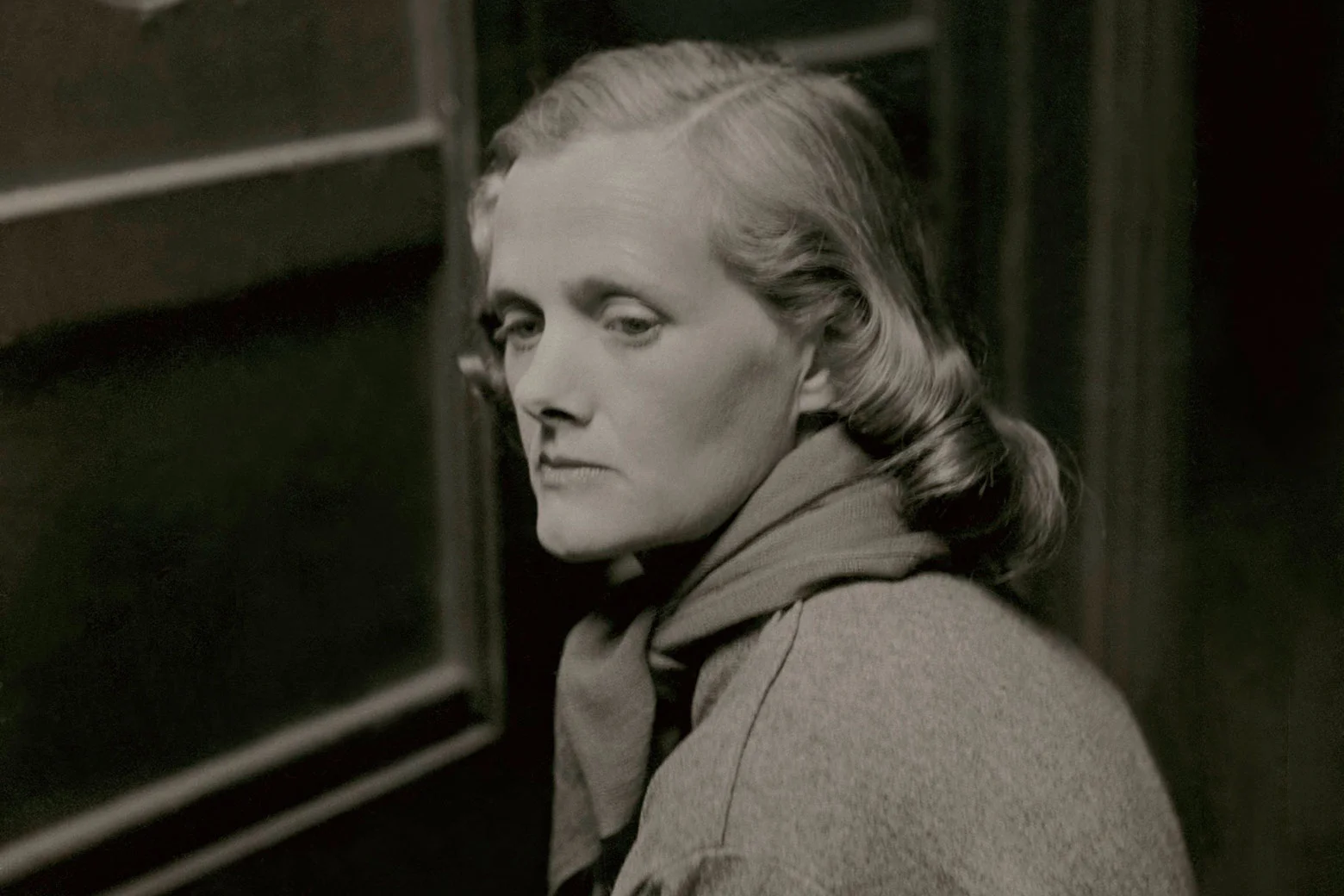
To be famous for just one novel—even a novel as good as Rebecca—is a mixed blessing for any author. Daphne du Maurier wrote 17 novels, a few plays, and numerous short stories, but she’s known chiefly for the narrative of the unnamed second Mrs. de Winter, a woman so overshadowed by her husband’s late first wife that her own story is titled after her predecessor. True, some are aware that two of du Maurier’s short stories, “The Birds” and “Don’t Look Now,” were adapted as great films by Alfred Hitchcock and Nicolas Roeg, respectively. But as for du Maurier’s other works—a literary legacy whose substance she struggled to defend against critics who dismissed her as merely a “romantic” novelist—relatively few readers know much about them.
After Midnight, a new collection of du Maurier’s short stories with an introduction by Stephen King, makes a bid to correct that. The collection’s subtitle, “Thirteen Tales for the Dark Hours,” nudges the English writer’s reputation away from romance—a peculiar term for a novel as ominous as Rebecca—and toward the gothic, a genre in which she seems more at home. (Not coincidentally, the gothic novel is also undergoing a contemporary renaissance.) Perhaps After Midnight’s publisher is hoping to set off a revival like the one that followed the 1996 publication of Just an Ordinary Day, a collection of Shirley Jackson’s short stories. Jackson, like du Maurier, hadn’t gone unread after her death, but even in 2010, with the publication of the Library of America’s volume of Jackson’s writing, a critic for Newsweek suggested that the LOA might have jumped the shark in devoting a whole book to “a writer mostly famous for one short story, ‘The Lottery.’ ” Since then, fortunately and justifiably, Jackson’s reputation has only grown.
Slate receives a commission when you purchase items using the links on this page. Thank you for your support.
Like Jackson, du Maurier was a mid-20th-century woman writer whose work didn’t always abide by conventional notions of femininity. Both women were preoccupied with the paradoxes of identity. Du Maurier—the daughter of two celebrated actors and a first cousin to the brothers who inspired J.M. Barrie’s Peter Pan—grew up an introvert among glamorous, oversize personalities. The narrator of Rebecca feels almost erased by the overwhelming charisma of a dead woman. Du Maurier’s biographer Margaret Forster describes letters in which the author wrote of possessing an alternate male self she felt had to be suppressed after puberty, the same self that she credited as the force behind her writing. Who du Maurier was at any time was subject to disorienting, unexpected change. In “The Alibi,” a story included in After Midnight, an office worker has a bleak epiphany while out for a walk with his wife and suddenly decides to rent a room in a tenement flat with the sole purpose of strangling the woman who rents it to him, along with her child. As a cover story, he pretends to be a frustrated painter looking for cheap studio space, but he immediately becomes so absorbed in this front that, homicidal plans abandoned, painting becomes all that matters to him.
Du Maurier also wrote stories that blur the line between madness and the supernatural, as Jackson did in her masterpiece, the 1959 novel The Haunting of Hill House. “The Pool,” one of the best stories in this collection, describes the summer a young girl and her brother spend at their grandparents’ house in the country. While her brother wants to play cricket and talk about bicycles and airplanes, Deborah longs to be alone so she can commune ecstatically with the natural world, like a baby druid or preteen Emily Brontë. Her reverence centers on a pool in the forest that she feeds with offerings of trinkets and believes could be a portal to “the secret world.” A radiant depiction of the idling, enchanted play of a child’s life, “The Pool” suggests why romantic isn’t an entirely alien adjective for du Maurier’s fiction—just not the kind of romantic that involves courtship and sexual love. Deborah pays as much rapturous attention to the pool and the woods around it as any 19th-century Romantic poet could have:
The late sun sent shafts of light between the trees and on to the alley-way, and a myriad insects webbed their way in the beams, ascending and descending like angels on Jacob’s ladder. But were they insects, wondered Deborah, or particles of dust, or even split fragments of light itself, beaten out and scattered by the sun?
Here is where du Maurier differs significantly from Jackson. While both women could be flinty and unsentimental, du Maurier, unlike Jackson, was an expert invoker of atmosphere and environment. She often glazed her imagery with her characters’ nostalgic yearning, as in her most celebrated sentence, the opening line of Rebecca: “Last night, I dreamt I went to Manderley again.” In “The Pool,” Deborah encounters a turnstile attended by a beckoning woman. If she can just pass through it, she believes, it will usher her into the “secret world where there were no laws, no rules.” But the turnstile appears only at night, and du Maurier leaves it to the reader to decide whether the girl has seen it or simply imagined it. When Deborah runs out into a thunderstorm in search of the turnstile, she passes out, waking up to learn that she has had her first period. With this revelation, she understands that the secret world “was out of her reach forever.” The loss, which was surely du Maurier’s own, feels catastrophic.
An ambivalence about womanhood runs through After Midnight—or perhaps it’s just ambivalence about heterosexuality. Several of the men in these stories segue unsettlingly from admiring a pretty woman to imagining how easy it would be to strangle her. Other male characters brood discontentedly about their difficult wives and racistly speculate about the merits of marrying an overseas “native” who would provide “silence, good service, perfect waiting, excellent cooking, no need for conversation.” The narrator of “The Doll”—a story once deemed too perverse for publication and until recently thought lost—falls obsessively in love with an elfin violinist named, yes, Rebecca, and tries unsuccessfully to “seize her, and break down her iron restraint,” only to later discover her in flagrante delicto with a life-size mannequin.
At least one of the secret worlds du Maurier’s characters find so magnetic is that of same-sex attraction and gender fluidity. Unconfirmed rumors of the author’s liaisons with several women—including the wife of her American publisher and the actress Gertrude Lawrence—persist. Although du Maurier was also attracted to men, married in 1932, and had three children, the notion of escape from the constrictions of heterosexuality haunt these stories. In the spellbinding novella “Monte Verità,” a man in his 70s recalls the history of his friend Victor, who marries a serene, ascetic beauty named Anna, with whom the narrator also falls in love. While Victor and Anna are mountain climbing in some unspecified European hinterland, they learn of a mysterious moon-worshipping sect living in a fortress at the top of the eponymous mountain. None of the fortress’s inhabitants are ever seen by outsiders, but every so often a local girl leaves her village (often on the eve of her wedding) and disappears forever behind its walls. One night, Anna vanishes too.
When the narrator of “Monte Verità” finally gains access to the sect, he is stunned with envious longing: “They were ageless, they were sexless, they were neither male nor female, old or young, but the beauty of their faces, and of their bodies too, was more stirring and exciting than anything I had ever seen or known.” Yet the place, austere and spartan, is no Shangri-la. “There are no illusions and no dreams on Monte Verità,” Anna tells him, only the ecstasy of the stony truths its name promises.
From the pages of After Midnight emerges a sense of du Maurier that’s far from the meek, naive narrator of Rebecca. These stories are the work of a protean, restless, and rather dangerous spirit with a decidedly pagan bent and a craving for solitude. When the girl in “The Pool” finally gets away from her family and into the woods, she kicks off her shoes, kneels, and calls out, “Mother of all things wild, do with me what you will.” The stories in After Midnight amount to the same incantation. They are wild at heart, like the woman who made them.



